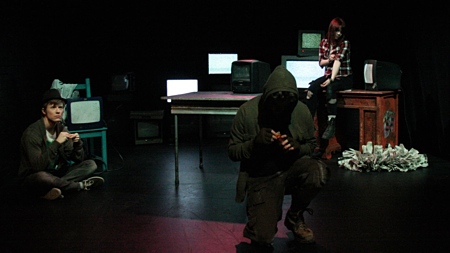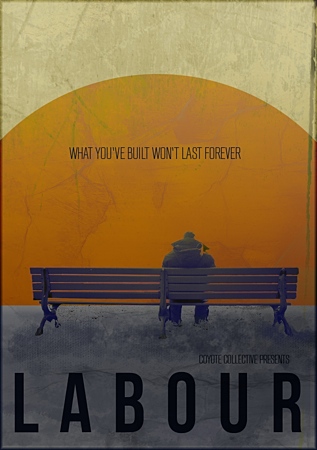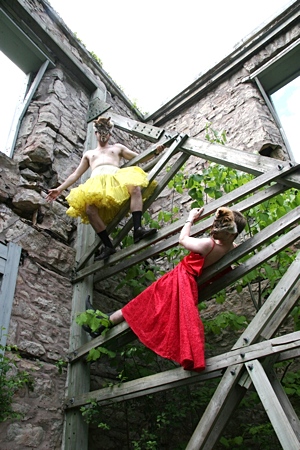Spotlight on Alumni: Coyote Collective
 Coyote Collective’s Like a Generation
Coyote Collective’s Like a GenerationWe are Susannah Mackay (SM), Eric Welch (EW), Blue Bigwood-Mallin (BBM), and Max Tepper (MT) of Coyote Collective. Coyote Collective was formed in 2012 by some upstart now-graduates of the Acting Conservatory and Creative Ensemble streams of York University’s Theatre Program.
Since its inception, Coyote Collective has become known for interweaving physical theatre with acerbic black comedy and clear narrative story-telling. Coyote’s flagship production Like A Generation [IndieGoGo Trailer] combined the pressing social disparity and restlessness of urban youth with TV cotton-candy entertainment, and led to a sold-out run. Since then, Coyote has gone on to create works with established Canadian creation company Clay & Paper Theatre, and interned with Canadian Theatre superstars VideoCabaret.
Up next, Coyote Collective is working on the premier of a new work: Labour, which runs from February 5th – 9th, 2014 at Theatre Passe Muraille Backspace. Labour will excavate the lives and working conditions of young, warehouse day-labourers as they try to control a life that seems to offer them no choices but to work as hard and as much as possible.
What was the most valuable thing you learned while studying in Theatre at York?
SM – I believe the most valuable thing that I learned at York was to listen. Before studying at York and beyond, I was eager to fill space, silence and stillness with anything. I was constantly dispersing and expending energy. But my time at York taught me to listen; to my peers, to myself, to my teachers. It was a valuable lesson that I am still learning in full.
 Coyote Collective’s Labour
Coyote Collective’s LabourIf you had the chance to go back and visit your younger self as you were beginning at York, what advice would you give yourself?
MT – First, do the work that is asked of you by your professors, but remember who you are as you develop as an artist. Remembering that is what will make your craft special and unique.
BBM – I went into York with the hopes of being an actor for film and TV. However I found a love for directing and writing, as well as acting and was exposed to so many facets of the art form that I didn’t know existed. What surprises me most about myself was the radical change of my goals and how much happier I became with the work. I went into York in the mindset that working in theatre was only a stepping stone to becoming recognized and I left with a thousand questions and a profound love for the work itself.
Did connections, friendships, relationships you made at York help you afterward?
MT – Absolutely. I was in the conservatory program, but my friendship with those in the creative ensemble and production program allowed me the confidence to create my own work, to study new ways to develop my craft. Also the faculty! Eric Armstrong has always been a strong and reliable resource. I have always been able to turn to him for audition advice, including practice for a ‘deaf voice’ that was needed for a Canadian Stage audition. Gwen Dobie was the faculty supervisor for Coyote’s first presentation of work (which we did before graduating and thus needed a faculty supervisor.) and she was a great person to talk to before and after we moved down to Theatre Passe Muraille Backspace.
EW – It’s our friendship that has brought us together and that keeps us working with each other. There are days where it allows us to attack the work with vigour and camaraderie that is unique and powerful. In that regard it can make this work easier. However, if you are going to be working in this social setting you have to be able to juggle the friendship with the professionalism that is required to do the work. Keeping this balance comes with ease most days, but every once in a while you need to hash things out with fisticuffs.
What was one thing you enjoyed about York that was outside of the Theatre?
SM – I took an amazing course outside of my major, called Topographies of the Human Imagination. It was a course focused on fantasy in literature, both ancient and contemporary and was taught by a professor and teaching assistants that were truly passionate. Neither my time in tutorial nor lecture was what stimulated me the most, but it was the amazing pieces of fiction that I was exposed to. So many of the books, short stories and poems that are now favourites of mine were introduced to me in this class.
Can you tell us a story of a moment where your training at York was clearly useful?
 Coyote Collective
Coyote CollectiveEW – Grant writing. Theatre Management is an invaluable class because of this. Every student in the theatre program should take it. Peter McKinnon gives you a crash course, but if you want to crash with a grant it’s best to do it in school before it really counts. Fellow theatre artists from different institutes frequently seem to be shocked that this is a part of our formal training, so don’t pass it by!
SM – When our young company began planning the first steps toward our first professional production, (Like A Generation, 2013) the practical skills many of us learned in Theatre Management became incredibly useful and relevant. Knowing how to accurately create a budget or write a concise yet compelling artistic statement was integral to attracting the attention of audiences and those in the position to bestow money or press on your little project.
What did you NOT get taught at York that you wish you had been taught?
SM – I wish that there had been more of an emphasis on discipline and endurance. One of my most dedicated professors, Allyson MacMackon, provided my class a taste of the discipline and passion that is needed to sustain the long, slow process of creation. It requires a self-knowledge and discipline that is touched upon, but not reinforced in class.
BBM – And discipline in pacing yourself. Upon my graduation, I pursued three shows that were all opened within weeks of each other. In my mind this was a good idea because I would get a sense for being a working actor and also get my name out there. In practice this was incredibly draining. You should pace yourself, get your life in order and only go after projects that you are passionate about so that you can give it your full attention and get the most of the experience.
MT – Theatre at York doesn’t teach you how to perform the sexual act of coitus with a prop on stage. In our previous show Like A Generation, a scene called for Eric to have sex with a television screen. It was a very bold choice that he and the director came to together, and they stood by it. I, however, always questioned the necessity of the scene. But more recently, I saw TheatreRun’s performance of The Double [NOW review] presented by Tarragon, in which the protagonist Golyadkin has sexual relations with his lover, who just so happens to be an up-right bass in the production. Seeing an established actor on a mainstage such as Tarragon embrace the hilarity and bravery of the sex-with-inanimate-object was inspiring, and that Eric’s performance with his television screen was just something that we had to learn how to do on your own.